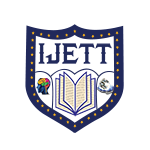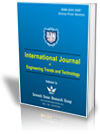Traceability Assessment Model to Estimate Quality of the Effective E-Procurement Process in Adoption
Citation
Surabhi Saxena, Devendra Agarwal"Traceability Assessment Model to Estimate Quality of the Effective E-Procurement Process in Adoption", International Journal of Engineering Trends and Technology (IJETT), V58(4),177-180 April 2018. ISSN:2231-5381. www.ijettjournal.org. published by seventh sense research group
Abstract
Developing high quality software is a necessary for software system. Traceability is a significant aspect during the software development process. Software that is easily traceable is known as high quality software. Quantification is an essential aspect that is acquainted with the objective of producing high quality software. It is suggested to assessment of traceability with design construct. In this article, experts propose a traceability assessment model. The developed models for computing traceability point outs the possible influence of design characteristics and also discussion the impact analysis of computation with design stage metrics.
Reference
1. J. Castro, R. Candida, A. M. Castor, and J. Mylopoulos, “Requirements Traceability in Agent Oriented Software Engineering”. Book chapter In Software Engineering for Large-Scale Multi-Agent Systems: Research Issues and Practical Applications, LNCS 2603, Editors A. Garcia; C. Lucena; F. Zambonelli; A. Omicini; J. Castro Springer Verlag. 2003.
2. Antti Evesti, Eila Niemela, Katia Henttonen and MakoPalviainen, “A Tool Chain for Quality-driven Software Architecting”, 2008, IEEE International Software Product LineConference.
3. J. Castro, M. Kolp, and J. Mylopoulos, Towards Requirements-Driven Information Systems Engineering: The Tropos Project. Information Systems Journal, Elsevier, 2002. Vol 27, pp. 365-89
4. P. Bresciani, P. Giorgini, F. Giunchiglia, J. Mylopoulos, A. Perini “Tropos: An Agent –Oriented Software Development Methodology’”, in Autonomous Agents and Multi –Agent Systems 8 (3): 203- 236, May 2004.
5. B. Ramesh, and M. Jarke, Towards Reference Models For Requirements Traceability. IEEE Transactions on Software Eng., vol. 27, pp. 58-93, Jan. 2001
6. O. Gotel, Contribution Structures for Requirements Engineering. Ph.D Thesis. Department of Computing, Imperial College of Science, Technology, and Medicine, London, U.K., 1996.
7. Nikhat et. al. , “Model to Quantify Availability at Requirement Phase”, American Journal of Software Engineering and Applications Volume 4, Issue 5, October 2015.
8. Antti Evesti, Eila Niemela, Katia Henttonen and MakoPalviainen, “A Tool Chain for Quality-driven Software Architecting”, 2008, IEEE International Software Product LineConference.
9. NupurSoni, Dr. MazharKhaliq, 2015, “Maintainability Estimation of Object Oriented Software: Design Phase Perspective”. International Journal of Advanced Research in Computer and Communication EngineeringVol. 4, Issue 3, March 2015.
10. DevpriyaSoni, Dr. NamitaShrivastava and Dr. M. Kumar, 2010, “A Methodology for Empirical Quality Assessment ofObject-Oriented Design”. (IJCSIS) International Journal of Computer Science and Information Security, Vol. 7, No.2, 2010.
11. M. Jureczko & L. Madeyski, “Towards identifying software project clusters with regard to defect prediction”, IEEE, 2010.
12. Nikhat et. al., “Model to Quantify Integrity at Requirement Phase”, Indian Journal of Science and Technology, Vol 9(29), DOI: 10.17485/ijst/2016/v9i29/89280, August 2016.
Keywords
Software Quality , Traceability , Assessment model



